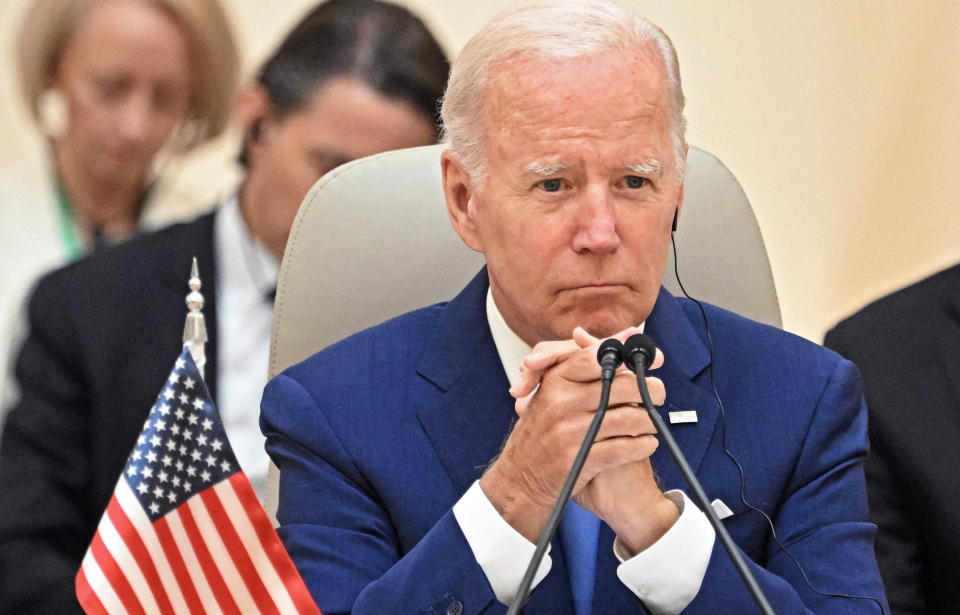Biden stands to get little domestic return from controversial Middle East trip
- Oops!Something went wrong.Please try again later.
- Oops!Something went wrong.Please try again later.
- Oops!Something went wrong.Please try again later.
JEDDAH, Saudi Arabia — President Joe Biden wrapped up his first presidential trip to the Middle East on Saturday with few clear domestic benefits from a trip that brought widespread criticism back home.
Biden received no concrete commitments from Saudi Arabia to increase oil production, the main deliverable that could have helped address his biggest domestic challenge of inflation, and made no significant progress toward a resolution between the Israelis and Palestinians.
While the conversations and face-to-face meetings Biden held in the region may prove to pay dividends over time, he will return to Washington with little to show a domestic audience for whom the number one issue is the economy, with competing concerns over social issues like abortion rights and gun violence. Biden’s approval rating has hit the lowest level of his presidency in several surveys less than four months before the midterm elections.
Even before Biden set off for the trip to Israel and Saudi Arabia, Democrats had accused him of backing down on his campaign vow to make Saudi Arabia a “pariah” after the killing of Washington Post columnist Jamal Khashoggi. Human rights groups that have pushed for reforms in Saudi Arabia said they felt betrayed by the trip.
"There are a lot of downsides to President Biden’s trip to Saudi Arabia and meeting Mohammed bin Salman," said former CIA director John Brennan in an interview on MSNBC Wednesday. He said Biden "has to extract from Saudi Arabia and from MBS some tangible means that’s going to advance the interests of the United States in the region, as well as just regional stability."
After days of speculation over how Biden would greet Saudi Arabia's de facto leader, Crown Prince Mohammed bin Salman, an engagement that became its own storyline, Biden opted for a chummy-looking fist bump over a more formal handshake.
The White House had suggested ahead of the meeting that Biden would be “minimizing contact” as a Covid precaution when asked if he would shake the crown prince’s hand. But Biden participated in a number of other handshakes and warm embraces throughout his visit, including with the crown prince’s father, King Salman.
Fred Ryan, publisher of The Washington Post where Khashoggi was working at the time of this death, called the fist bump “shameful." The former fiancee of Khashoggi, Hatice Cengiz, tweeted a photo of the fist bump, saying of Biden the “blood of MBS’ next victim is on your hands.”
Biden said he raised Khashoggi's death in his meeting with the crown prince in which he indicated that he believed the crown prince was responsible for the killing. But Saudi diplomat Adel al-Jubeir downplayed the exchange in an interview with CNN, saying the topic was brought up by Biden briefly and that he believed the president had accepted the explanation by the crown prince that those responsible had been held accountable.
Following the meeting with the crown prince, Biden said Saudi Arabia made some broad commitments to addressing the high price of oil, but gave no details on what those would be and when they would occur.
“We had a good discussion on ensuring global energy security and adequate oil supplies to support global economic growth that will begin shortly,” Biden said during a press conference following the meeting. “And I’m doing all I can to increase the supply for the United States of America which I expect to happen. The Saudis share that urgency, and based on our discussions today, I expect we’ll see further steps in the coming weeks.”

White House national security adviser Jake Sullivan said the White House was hopeful there would be additional actions by the OPEC+ oil producers alliance in the “coming weeks.”
In Israel, Biden took hits from both sides of the aisle, with Democrats disappointed he didn’t go further in pressing leaders there over the country’s treatment of the Palestinians, and Republicans criticizing his visit to a Palestinian hospital in a disputed section of Jerusalem.
Human rights and international media groups, meanwhile, had wanted to see Biden do more around the investigation into the death of Palestinian-American journalist Shireen Abu Akleh. As Biden spoke in the West Bank, he faced a large photo of Abu Akleh placed on a chair in the front row where journalists were seated.
Biden said the U.S. would “continue to assist on a full and transparent accounting of her death,” but he didn’t announce any additional steps that would be taken to ensure that would occur.
The president also acknowledged in Israel that there wouldn’t be any resolution to the conflict between the Israelis and the Palestinians in the "near term" and said the U.S. was being realistic about what it could achieve.
The White House sought to emphasize a number of steps the U.S. helped facilitate during the trip, including the opening of Saudi airspace to commercial flights to and from Israel, infrastructure projects to improve digital connectivity in the region, assistance to the Palestinians and a deal over islands in the Red Sea.
During a summit with Gulf leaders, Biden emphasized that the U.S. would continue to play a role in the region and counter efforts by China, Russia and Iran to take a greater foothold.
It was among the efforts that could provide important value for the U.S. but would take years to play out.

